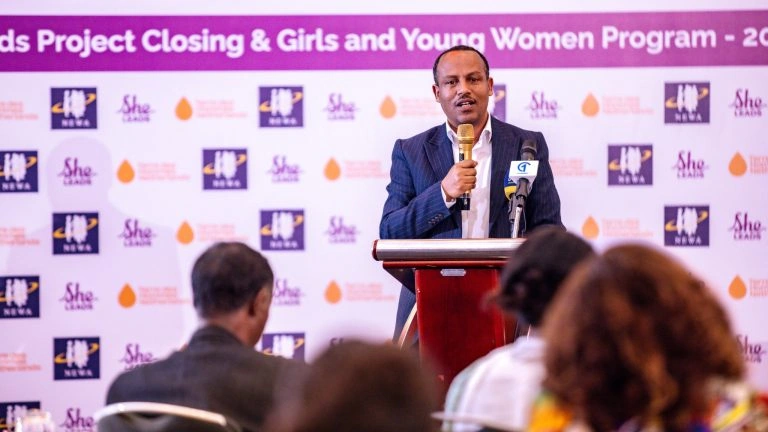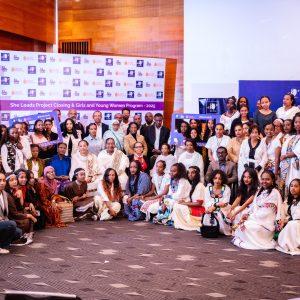Interview with Workneh Abebe, GAGE by Abebe Fikr | She Leads closure programme
29.10.2025
On September 28, 2025, Workneh Abebe (GAGE) was interviewed by Abebe Fikri for the Ethiopian reporter. You can read the translated transcript below.
The closure of schools in areas of conflict in the Amhara region over the past two years has led to girls moving to Addis Ababa and other regional cities to work as prostitutes, an international research group called Gender and Adolescence: Global Evidence (GAGE) has announced.
The study was conducted on adolescents living in conflict and drought-affected areas in Oromia, Tigray, Somali, and Afar regions, including the Amhara region, and found that sexual violence, including child marriage, has increased significantly.
The study was presented at the closing ceremony of the project, ‘She Leads’, which has been focusing on young women for the past five years under the theme ‘Ethiopia leads the social integration of women,’ by Workneh Abebe, the research programme’s Ethiopian representative.
Workneh, who said that a sample was taken from 67 kebeles in five districts of South Gondar Zone, Amhara Region, said that schools in the kebeles have been completely closed for the past two years, and a large number of students have been forced to drop out of school.
The study revealed that due to the closure of schools, most students, over the age of 13, have migrated to different areas, where girls are engaged in prostitution, hotel work, and other informal activities, boys are engaged in paid labour, and others are forced to marry before they reach the age of marriage.

According to the study, Workneh explained that due to the closure of all rural schools except in woreda towns, in addition to prostitution, they are forced by their parents to marry before the age of 18. The area has a serious security problem, and out-of-school children are in high danger.
The study was conducted in 2025. Workneh said that during the war in the north, rape and other forms of violence against women and girls were widespread in Tigray region, especially in areas where Eritrean troops were stationed. Similarly, in other regions included in the study, children in the study were subjected to other forms of violence, including child marriage, by their families.
The representative noted that harmful cultural norms were widespread in the Oromia region, East Hararge, Afar, and Somali regions, and that many children were forced to marry before the age of 18, drop out of school, and have children. The study showed that 78 percent of the girls in South Gondar and East Hararge were forced to marry before they reached the age of marriage (18) or before they completed secondary school. Similarly, in Zone 5 of Afar region, 49 percent of the girls included in the study were married under family pressure before reaching the age of marriage.
Workneh, who said that girls who marry before reaching the age of marriage in these areas drop out of school even if they are in school, explained that this situation is widespread in all areas except Amhara region. According to the study, only 20 percent of the girls included in the study continued their education after marriage.
The researcher said that before the conflict, South Gondar was better than other study areas in not dropping out of school after marriage, with 28 percent of the girls in the study continuing their education after marriage, while only eight percent of girls in East Hararghe continued their education after marriage, and most of them found it difficult to continue their education after marriage.
Explaining why children get married, Workneh explained that the differences in attitudes towards marriage and the prevalence of problems such as drought, war, poverty, and other factors are the main reasons for early marriage.
On the other hand, Workneh explained that women in some regions get married before the age of marriage to escape the pressure of work in their families, and that most of them face severe labour exploitation by their families.
The study shows that the age of marriage is decreasing in the Afar and Somali regions and that child marriage is increasing, especially in the Afar region. Workneh explained that the traditional system called the ‘Absuma marriage system’ has exposed many girls to early marriage.
The representative explained that ‘Absuma’ is a system that forces a girl to marry her mother’s brother’s sons or her cousin’s sons, explaining that 97 percent of marriages are decided by the family. The absuma marriage system prohibits marriage with persons outside the clan system. According to Workneh, girls have no rights in this traditional marriage system, and even if they try to commit suicide, the marriage will not be annulled, he said, citing the study as a basis for explaining that many girls are migrating to Arab countries out of fear of marriage.
In addition to migration, some commit suicide because they do not want to marry close relatives. In the Somali region, the increase of drought and lack of proper access to family planning education and services have contributed to child marriage, said Workneh, ‘In the past, the man would give the woman he was marrying a lot of cattle as a gift. However, today, due to the prevalence of drought and the lack of many animals, men easily take women without/with little marriage gifts, which has accelerated child marriage.’
Workneh recalled that a study conducted in the Tigray region showed a significant increase in child marriage during and after the war, citing the study, which found that women were forced to have children at the age of 13 or 14, especially during the war, due to the lack of birth control in the region. After the war, young people who participated in the war and returned fighters engaged in rape activities and forced girls to marry them, and adolescent girls' rape has been observed, Workneh added.
Similarly, in the Afar region on the border with Tigray, they said that children are being married off to replace family members who died in the war. In addition to eliminating war, poverty, and other factors that push young people to marry off before the age of 18, the study suggests that it is appropriate to eliminate the harmful customs and norms of the community to prevent the problem. It is said that it is necessary to prevent violence against women and girls by focusing on areas such as Afar and Somali regions that do not accept and do not implement family law.
The Ministry of Women and Social Affairs confirmed that the ideas presented in the study are fully accepted and that it is aware of the problems. The Ministry’s Women’s Rights expert stated that it is working to solve the problems by taking the information obtained from the study presented on the day and other studies as input. [Senior expert Ms. Mahlet Amare.]
Ms. Mahlet, who said she was aware that the study had recently been completed, said that the government is allocating a budget of 3.1 billion birr to support war-affected areas.
